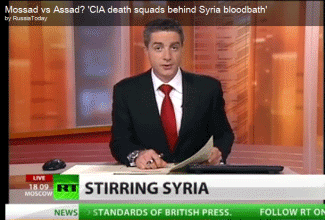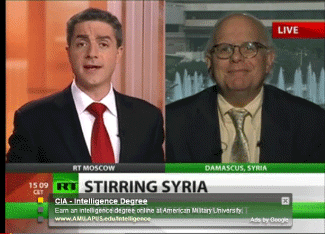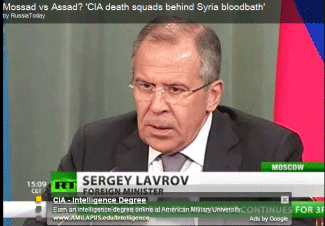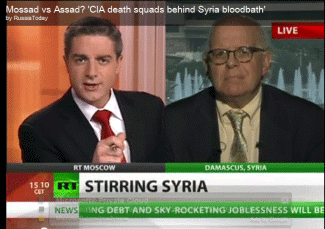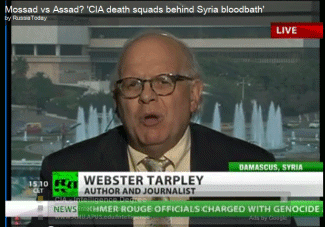November 21, 2011
NOTICE: THIS WORK MAY BE PROTECTED BY COPYRIGHT
YOU ARE REQUIRED TO READ THE COPYRIGHT NOTICE AT THIS LINK BEFORE YOU READ THE FOLLOWING WORK, THAT IS AVAILABLE SOLELY FOR PRIVATE STUDY, SCHOLARSHIP OR RESEARCH PURSUANT TO 17 U.S.C. SECTION 107 AND 108. IN THE EVENT THAT THE LIBRARY DETERMINES THAT UNLAWFUL COPYING OF THIS WORK HAS OCCURRED, THE LIBRARY HAS THE RIGHT TO BLOCK THE I.P. ADDRESS AT WHICH THE UNLAWFUL COPYING APPEARED TO HAVE OCCURRED. THANK YOU FOR RESPECTING THE RIGHTS OF COPYRIGHT OWNERS.
Damascus
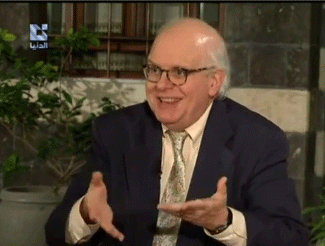
[Webster Tarpley] We have to look for the United Arab Emirates. They took a leading role in Libya. They'd like to do that here, too. The Emir of Doha is a very interesting figure. The Thani family. People who believe that they can start a revolution all around them and the revolution will not destroy them, whereas in reality, it's very likely to destroy them.
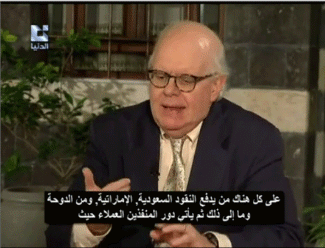
There's a figure like this in European history. It's a guy called Philippe Egalite. He was a member of the French royal family, at least a branch of it. And he supported the French Revolution. And he got his head chopped off. That's, I think, the Thani. Anyway, these are the people who are paying: Saudis, UAE, Doha, and so forth.
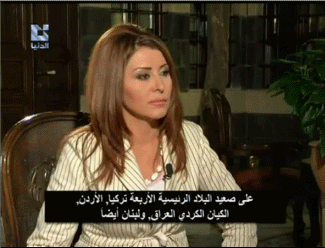
Then we have a logistical apparatus. We have to have bases from which these things can be done. And in Syria, unfortunately, we have to deal daily with the betrayal of good neighborly relations by the main four countries: by Turkey, by Jordan, by the Iraqi Kurdish entity, and also by Lebanon. So we have four places where a rebellion has been tried some months ago, and each one of them is peripheral. They are all at the edge of Syria. They're not in the middle, they're at the edge. And it simply shows you, when you look at the map, that this is being done from outside of the country. So that's the logistics. So we've done the intelligence agencies, the money, the logistics.
Now we have to look at some leadership questions. Who are the managers? Who is running this so to speak? Well, you could say it's the State Department and the Foreign Office. But you have to have people who really know what they're doing in some detail. And I would say there are two. One is a renegade former foreign minister of Syria, the infamous [Abdul Halim] Khaddam. Khaddam, of course, has been around here for a million years. When I saw Khaddam again, I said, "Hasn't he been dead for 20 years?" But no, he's 80 years old. Some people would say he's probably a vampire. I don't know, but he's very, very old. And he is now parading himself in Paris saying that he's the leader of the democracy movement in Syria. This is somebody who worked for Assad the Elder for a long time, and had no problems with that, but now, after only 30 or 40 years, he's got problems. So this is obviously somebody who has made a deal. He'd like to be like [Ahmed Abdel Hadi] Chalabi or [Habar] Yoonis, or somebody like this. You've got to have somebody who is respectable. Khaddam is respectable because he was the foreign minister, and he's probably a member of a freemasonic lodge by the look of him.
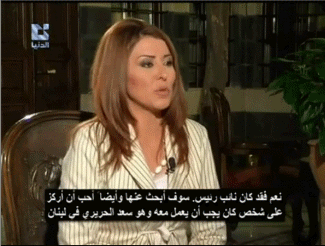
[Hanaa Alsaleh, Syria Addounia Television] He was vice-president.
[Webster Tarpley] And then I would also stress somebody I think he works with is Saad Hariri of Lebanon. Because I think Lebanon is really the place where the most logistics comes in. Some of these other places are not so important. Jordan was very important from the beginning, but I think right now Lebanon is the most important. So I would say, the overall strategic direction is probably Khaddam from Paris, and then close-in and logistics, I think it's Saad Hariri.
Then you have to ask yourself, what are you dealing with? In other words, what's going on? Where's the shooting, the killing? Where does this come from? I would say that the first thing you are dealing with is death squads. And death squads, this is a concept that comes out of Latin America in the 1970s and the 1980s. It comes out of Argentina. There was something called the Dirty War in Argentina, which was not really a war, it was just a series of murders. But lots and lots of murders. Thousands, tens of thousands of murders. Death squads are a technique of the CIA. If you knew a guy named John Negroponte, Negroponte was famous, because when he would come into a country, wherever it was, within six months death squads would show up. And these are groups of veterans, special forces, criminal elements, and mercenaries, who kill people.
The difference is that in Latin America, this was politically specific. In other words, the CIA would create a death squad. And they would kill usually Communists, trade-unionists, leftists, and people like this. The difference you have in Syria is you have death squads, but they are not looking so much for specific targets, although they may do that, but they're mainly interested just in killing. So it's blind terrorism, random killing, a kind of uncontrollable massacre of people.
And let me just be specific about what I mean by this. If you read the crazy Western media, they will tell you that Homs is the great center of this rebellion here, the civil war in Syria. Well, when we got here with the delegation that I was with, we went right to Homs. At least I did. Within 24 hours after coming, we went to Homs. And not only did we go to Homs, we went to Zara, we went to the neighborhood that is supposedly the center of all agitation. And when you get there, what you see is first of all, empty streets. And then eventually we saw 500 people in a public square. And they were agitating somehow. They were having a demonstration of some kind.
Homs (Arabic: حمص Ḥimṣ), previously known as Emesa (Greek: Ἔμεσα, Emesa), is a city in western Syria and the capital of the Homs Governorate. It is 501 metres (1,644 ft) above sea level and is located 162 kilometres (101 mi) north of Damascus. Located on the Orontes River, Homs is also the central link between the interior cities and the Mediterranean coast.
Homs did not emerge into the historical record until the first century BC at the time of the Seleucids. It later became the capital of a kingdom ruled by the Emesani dynasty who gave the city its name. Originally a pagan center of worship for the sun god El-Gabal, it later gained importance in Christianity under the Byzantines. Homs was conquered by the Muslims in the seventh century and made capital of a district that bore its current name. Throughout the Islamic era, Muslim dynasties contending for control of Syria sought after Homs due to the city's strategic position in the area. Homs began to decline under the Ottomans and only in the 19th century did the city regain its economic importance when its cotton industry boomed.
Today, Homs is a major industrial center, and with a population of 1.5 million people who claim descent from the Banu Kalb tribe, it is the third largest city in Syria after Aleppo to the north and the capital Damascus to the south. Its population reflects Syria's general religious diversity, composed mostly of Arabic-speaking Sunni Muslims and sizeable Alawite and Christian minorities. The city boasts a number of historic mosques and churches and is close to the Krak des Chevaliers*, a world heritage site.
_______________
*Krak des Chevaliers (French pronunciation: [kʁak de ʃəvaˈlje]), also Crac des Chevaliers, is a Crusader castle in Syria and one of the most important preserved medieval castles in the world. The site was first inhabited in the 11th century by a settlement of Kurds; as a result it was known as Hisn al Akrad, meaning the "Castle of the Kurds". In 1142 it was given by Raymond II, Count of Tripoli, to the Knights Hospitaller. It remained in their possession until it fell in 1271. It became known as Crac de l'Ospital; the name Krak des Chevaliers was coined in the 19th century.
The Hospitallers began rebuilding the castle in the 1140s and were finished by 1170 when an earthquake damaged the castle. The order controlled a number of castles along the border of the County of Tripoli, a state founded after the First Crusade. Krak des Chevaliers was amongst the most important and acted as a centre of administration as well as a military base. After a second phase of building was undertaken in the 13th century, Krak des Chevaliers became a concentric castle. This phase created the outer wall and gave the castle its current appearance. The first half of the century has been described as Krak des Chevaliers' "golden age". At its peak, Krak des Chevaliers housed a garrison of around 2,000. Such a large garrison allowed the Hospitallers to extract tribute from a wide area. From the 1250s the fortunes of the Knights Hospitaller took a turn for the worse and in 1271 Krak des Chevaliers was captured by the Mamluk Sultan Baibars after a siege lasting 36 days.
Renewed interest in Crusader castles in the 19th century led to the investigation of Krak des Chevaliers, and architectural plans were drawn up. In the late 19th or early 20th century a settlement had been created within the castle, causing damage to its fabric. The 500 inhabitants were moved in 1933 and the castle was given over to the French state, under which a programme of clearing and restoration was carried out. When Syria declared independence in 1946, the castle left French control. Krak des Chevaliers is located approximately 40 kilometres (25 mi) west of the city of Homs, close to the border of Lebanon, and is administratively part of the Homs Governorate. Since 2006, the castles of Krak des Chevaliers and Qal'at Salah El-Din have been recognised by UNESCO as a World Heritage Site.
-- Homs, by Wikipedia
So we were a little bit frightened, because we thought maybe they were armed or something. Who knows? We leave our bus and go onto the street, and here are these people, and the no. 1 issue for them is not what you think. It's Mazut. They're concerned about fuel oil. And they're concerned about the fact that it's getting cold, and the winter is here, and they need to heat their homes. And there's not enough fuel oil. And they have criticisms of the governor of the province who we also met, who seemed like a good guy to me, but they say he doesn't do enough to get the Mazut.
Now as soon as you start talking about Mazut, there are two things. One is that there are already economic sanctions by NATO, this economic warfare, that influences the availability. The other thing is, I've been told that various of these terrorists, these death squads, they specifically target the trucks that carry fuel oil, Mazut, and they try to hijack the trucks and take them to Turkey where they can sell it at a better price. Or Lebanon. Wherever it is.
So we got to see these people demonstrating. The question then is what was the political coloration? It was pro-Assad. And they had these portraits of Assad which were not the well-designed, new, well-printed, photographic arts that the government might give you. But these were old pictures clipped out of magazines or something. This was a poor man's portrait. But they're out there showing these portraits.
So the amazing thing is, first of all, the biggest issue is fuel oil. Secondly, it's pro-Assad, not anti-Assad. And then we got to see, they had these plastic containers that the fuel oil goes in, and they had about 120 or something of these lined up in a row, and they were just trying to agitate that they wanted to get this Mazut.
Then we went to the hospital quite close by -- we're talking the Zara Hospital -- last Tuesday, and here we find some doctors, some nurses, some patients -- all different people -- and a lot of people who just happen to be there. And they see for the first time there are foreigners in Homs. Because I think this was the first delegation of foreign writers, journalists to come in. Because we were allowed to do this by the government. The government said you can go wherever you want, and we did. And we told them we were going to go there, and we did go there.
So when you talk to the people in this hospital, they say they are undergoing seven wounded in one day, and five dead. They had one soldier who was killed by five terrorists ganging up on him. And then some days they have as many as 80 total dead and wounded. And some days it's down to three or four. But this is what's going on.
And you ask, well, who is doing that? Is it the Army? No, it's not the Army, it's terrorists. In other words, it's snipers with sniper rifles who are up on the roofs of the various houses. And in the nighttime, or 9:00 in the morning, 3:00 in the afternoon, 11:00 at night, the snipers come out and they start shooting people. And they kill people. And it doesn't matter who you are, whether you are a man, woman, child, you can be a Ba'athist or a Communist, it doesn't matter, they'll kill you anyway. You can be Christian -- any kind -- Greek Orthodox, whatever, Malachite, Syrian -- you can be a Sunni, you can be a Druze, you can be a Kurd, you can be anything and they'll kill you. So it's an equal opportunity killer. Therefore, it's different than a traditional South American death squad, it's actually worse.
So I think that is extremely dramatic proof that this story -- I just saw one of the presenters on BBC saying, "And of course, Homs is the center of this rebellion" -- well, I've been there. I've been with people all around me. They couldn't wait to tell their stories. And then you ask them, "What should happen? What is the answer to this? What are you demanding?" And they say, "We want the Syrian Army to come in large numbers. We want more soldiers here." What should they do? They want the soldiers to climb up on the roofs of the houses and stay there and patrol, and make sure that the snipers can't come and start killing people. And that's what they want. I suppose they'd like some helicopters up above, and maybe some tanks in the streets just to make it complete.
But the big thing is they want the Syrian Army. And if they have a complaint, it's they say, President Assad didn't send enough troops, not fast enough, not enough, and not with the right orders. Because from the beginning, from many, many sources we were told there was this order saying, "Don't shoot anybody." Well, of course, if it's a civilian demonstration, you shouldn't shoot at a civilian demonstration. But if you've got 200 or 300 snipers in an ambush, then probably you better start defending yourself any way you can.
So the great irony is that the Western media is saying "The Syrian people want the Army to leave the cities." And then you go there, and the Syrian people tell you, "We want the Army to come into the city." So I think that's all pretty clear.
[Hanaa Alsaleh, Syria Addounia Television] What do you think, or what do you answer the international community -- Barack Obama, Hillary Clinton and Arab League -- who say President Bashar al-Assad has to withdraw the Army from the cities?
[Webster Tarpley] I have simple advice: Shut up. Stop lying. Remember, the UN Charter, no matter what the Security Council might say or not say, the United Nations Charter, which has some value, says, "interference in the internal affairs of sovereign states is not allowed." And this crazy Libya resolution about the responsibility to protect civilians, you have to ask yourself, "What's more authoritative? The Charter, which was really approved by a lot of countries a long time ago, or the things that go through the Security Council from day to day?" It's one of the problems in the United Nations. In other words, in the U.S. system, there's a difference between Constitutional law and statute law. If it's just a law, you need a majority, but if you want the Constitution changed, that's much harder.
The problem with the United Nations is some people in the United Nations will say, "Anything the Security Council decides to do is international law." That can't be. And one of the reasons is this. The Libya resolution was passed at a time when the Russians were very weak because of Medvedev. Medvedev foolishly believed in the reset with Obama. I tried to warn them. Well, they have their reasons. This was really foolish. And this was a colossal historic tragedy. Because all it would have taken was a veto by the Russians. The Chinese would have joined it. And then it would have been really hard for NATO to do it, because the little NATO countries, the smaller ones: the Norwegians, Dutch, Canadians, and smaller populations, a lot of them can't legally do the bombing unless there's a UN mandate. So if you can block the UN mandate, you can block the whole thing.
So unfortunately we're now in a period of international anarchy. And this should make us pause for thinking. Because international anarchy is dangerous. One of the times we had international anarchy was 1914. Right before World War I international law had pretty much gone out the window. Or 1938, Munich. Or 1939, Hitler attacks Poland. That's also international anarchy. We are now back in international anarchy. This means that the danger to all of us is greater.
The UN Charter is concerned about avoiding war between states. It rightly regards that as much worse than anything else. Now we've got these meddlers, I guess we could say, imperialists and other meddlers, who want to change all that and say, "No, the really important thing is the responsibility to protect civilians," even though that virtually guarantees war. Because it means that at some point somebody is going to say, "China, we have to come in there and protect," or Russia, or somebody who is powerful enough to defend themselves.
So what I would say to the people that you mentioned: Hillary Clinton and Barack Obama, is that these people have gone insane. In Washington, D.C. during the course of this year, you've had a growing war psychosis, a hysteria. What is called "The Arab Spring" I would say is a complete fraud. It's an absolutely fraudulent creation. Because what you're actually dealing with here are two things: one is a world economic and financial depression worse than the 1930s, and this means that in many, many countries we have high unemployment, high youth unemployment, and rising prices for food because the banks are speculating on food prices. So it's not so hard to get people riled up about economic demands because they have them.
And the other side is this: that the CIA and the State Department have decided that they will not allow any independent nation-states to continue to exist. They want to destroy all of them. And that's what you have, this process. It began about a year ago with the third WikiLeaks document dump. WikiLeaks, of course, is a CIA limited hangout operation. In other words, a process of selective revealing of certain documents that are edited. Other documents remain secret. But the whole thing is designed. Designed to do what? Designed to make the enemies of the CIA look bad. Because if you look at the WikiLeaks document dump, who is suffering from this? Who is bad? Who gets hit? Ben Ali, Gaddafi, Mubarak, Putin, Berlusconi, Karzai, Maliki, Kirchner in Argentina, all of the enemies of the CIA get hit. And the CIA, well, nobody in the U.S. got hit, nobody in Britain, and nobody in Israel. They're heroes. That's what they said. Alec Ross in the State Department, he's an assistant to Hillary Clinton, was asked by France 24, "What do you think now, almost a year later about Wikileaks? Has this been a problem for you?" And he essentially confessed and said, "No, WikiLeaks is not a problem for the State Department. It makes us look good. It shows us doing good things. We have no problem with WikiLeaks." That was really an unguarded moment. So that is what a limited CIA hangout operation is. It's like a strip tease. Certain things are shown, other things not shown, and the whole thing is carefully controlled.
So that set it into motion, right? And between the WikiLeaks document dump and the fall of Ben Ali, well, it was just a couple of weeks. The overthrow of Ben Ali in Tunisia began within 10 days I think of the WikiLeaks document dump.
[Hanaa Alsaleh, Syria Addounia Television] Are the public in the U.S.A. convinced or not of these facts you said?
[Webster Tarpley] Well, 100% of the readers of Tarpley.net, my website, know the score. Other than this, it's very hard to say. Maybe this is an area that many people are going to find very complex. I think American people have a better understanding now about economic issues than they did five years ago. They know Wall Street is an enemy. They know they have to fight the bankers. But when they get to these complicated foreign policy issues, this is harder for a lot of them.
So the goal is this: the CIA says no nation-state shall be allowed. And this is important, too, because the idea of the independent nation-state goes back to the famous Treaty of Westphalia, at the end of the 30 Years War, which was a terrible war in central Europe. So it's 1648. At that point we have a state system. In other words, a European system of politics based on these independent nation-states. And that whole experience was very costly. A lot of people died to get to the point where people realized that an empire was not good, the Holy Roman Empire was not a good thing in Europe. So therefore, you had to have the independent nation-state. Now the CIA, the State Department, and Wall Street say, "No, that's no good."
Now, why did they do that? The depression I think is the key. You have the bankruptcy of the U.S. banks in 2008, Lehman Brothers, and everything to do with this. You now have the bankruptcy of all the European banks. So we have the whole NATO banking world completely bankrupt. What's the response of the imperialist ruling class to that? Well, they say, "Increase the rate of looting. Increase the rate of pillaging and sacking and robbing and exploiting the people. Drive down wages. Destroy the unions. Cut the standard of living. Cut the budgets. Do all these things, so that more money will be available for future bailouts of banks."
[Hanaa Alsaleh, Syria Addounia Television] And where is Israel in all of this, and the Zionist lobby in the USA?
[Webster Tarpley] Israel, of course, is an integral part of it. I would say that basically, it's one seamless unit: the U.S., the British, and the Israelis. That's one thing. The Israelis, of course, are in a more exposed position. They have special problems. They have special political problems above all. Basically, they are in continuous crisis at this point. They are very demanding. They want the U.S. and the British to make life possible for them the way they see it, which I don't think can be done.
[Hanaa Alsaleh, Syria Addounia Television] And the Zionist lobby?
[Webster Tarpley] The Zionist lobby, of course, is alive and well. It's been there for a long time. I would just warn people, "Don't think that the Zionist lobby runs the United States." It does not. The U.S. ruling class did not need to import Zionists in order to be evil. It was already plenty evil in its own right. And I would just warn people about that. If I'm from the CIA, and I want to operate in the Arab world, what should I do? What's my cover? Anti-Israeli, anti-Zionist. It's the easiest thing in the world. And one of the favorite tricks of the CIA in the Middle East is if something terrible happens they say, "We didn't do that. That was the Mossad." So you have to be extremely careful with some of these things. You're going to have all of these "former" CIA agents come forward and say, "You know, I'm really fed up with the Mossad. Look at what they did: this, that, and the other thing." This is now a game of mutual betrayal by two gangs of thieves and murderers. So I think it's just clear that all are bad. But I don't think you need to get to the point of thinking that Israel is the center of the world, because I don't think it is. The Israelis may think this, but I don't share it. And I think when you look at the historical centers, London is the historical center, and New York has tended to join it. And I think Israel is sort of a branch of that. It's certainly a client state, right? It couldn't exist without massive transfers of U.S. resources. Some people then say it's gotten so powerful that it runs the U.S. I think that's an exaggeration, and I think the CIA promotes that exaggeration.
[Hanaa Alsaleh, Syria Addounia Television] Now, Mr. Webster, I wanted to ask you as an American citizen, Hillary Clinton said to the Syrian armed group, "Don't go to the Syrian authority. Don't go through the Army. Stay, and we will support you." I want your opinion of this as an American citizen.
[Webster Tarpley] First of all, don't believe that, because she won't, or she may not. I remember when Bush the Elder said to the Shiites of Iraq: "Rise up and overthrow Saddam Hussein, and we'll be there in just a minute." And they all got killed. So I would hope, whoever you are listening in, and I don't care what kind of a person you are, "Don't believe that. Don't do it. Don't engage in anything based on the promises of Hillary Clinton."
She has gone a little bit crazy lately, crazier than before. I have to now go into an area that might seem to be off topic. She personally is having some kind of a nervous breakdown, because she has gained about 20 to 30 pounds of weight since she became the Secretary of State. And this is a problem for her, because we have Michelle Obama who has this campaign against obesity. Have you seen this? Michelle Obama says Americans are too fat. Alright, fine. But she wants to have a campaign about this. And when you read the supermarket tabloids in the U.S., like the Star or Globe, they say that Michelle Obama has been attacking and criticizing Hillary Clinton because of her weight, and saying, "How dare you? You're the face of the United States in the world and look how fat you are, and you're destroying my campaign." And therefore Hillary is in some kind of a nervous breakdown. Now obviously I'm kidding, though this is a real complex that's going on.
The reason why we have so much insanity, the more basic reason, is because of this banking situation once again. If you take an imperialist ruling class, and their derivatives' structure, and their debt structure, and their banks are blowing up, are collapsing and going bankrupt -- and that's what we have in New York and London -- then that imperialist ruling class goes crazy. They get into flight forward. They become hysterical. They become utopian. They can't understand cause and effect. And that's what you see in the United States. You see a ruling class which is losing its moorings, it's anchoring in reality, and is going into an area of mental insanity. And Mrs. Clinton is one. I would also point to Susan Rice at the United Nations. If you could imagine a boiling cauldron of hatred, I guess that's her. And she is supposed to be concerned about human rights? Look at her, she's full of hatred for every human being on this earth, it seems.
[Hanaa Alsaleh, Syria Addounia Television] And she also always attacks others. I wanted to ask you about the international community, like the Security Council or UAE, or something like this. Do you believe they really care about the rights of human beings all over the world?
[Webster Tarpley] Who could believe that? I guess you have to be very naive and very gullible to do that. And we've got a lot of very naive and gullible people in the world. Tahrir Square was full of naive, gullible dupes. Somehow, they thought a revolution was where you kick out Mubarak and somebody else like Tantawi takes power. And you call that "your revolution"? Revolution is when YOU take power, not when Tantawi takes power. Obviously, there's a cultural crisis in our times. There's a crisis of political education. And people just don't know what they're doing.
But let's just look at the Security Council for a second, and what's going on there. I think I mentioned before, the tragic thing that we had is this Medvedev interlude. Medvedev represents forces in Russia who are in favor of globalization. There's a similar faction in China who are interested in joining the globalized, speculative, parasitic financial casino economy of speculation, anything but production. Like financial services and so forth. And it's also got something to do with Obama. Obama, of course, is a Wall Street puppet. I wrote not one book, but two books against Obama during the election campaign, before the main election: one in the springtime of 2008 called "Obama, the Postmodern Coup, the Making of a Manchurian Candidate," and in August, right before the Democratic convention, I was ready with a second book called, "The Unauthorized Biography of Barack H. Obama." And of course, the essence here is that Obama operates with deception. Bush was a very brutal, open imperialist. He was a thug. That was clear. No doubt about it. Therefore, he got a lot of opposition for what he did. Obama's method is different. Obama is about fooling people, trickery, deception, betraying people, trying to neutralize opposition. Because how can you be against this wonderful, messianic figure?
So that's one of the things that's confused people. And when Obama came in, he went with this reset when we had the famous meeting of Mrs. Clinton with Lavrov, and she showed him this little button that was supposedly the reset. Well, a reset means that there's a rational partner for you to deal with. And unfortunately, in Washington, there's nobody in power that's got any rationality.
So I think we have to be very glad, very happy and grateful that Putin seems to be making a comeback. We've had two or three good things happen in Russia lately, and we really needed this. One is not only was Medvedev put in a position to get out of the presidency, but there's also this other guy, [Alexei] Kudrin, the finance minister, who is very, very bad news. This is neo-liberal Chicago economics, shock therapy, International Monetary Fund, the oligarchs. And he wanted to be the prime minister. In other words, Kudrin said, "Get rid of Medvedev. Ease him out," and Kudrin becomes prime minister as Putin gets up there. And somehow he's out. And I have to think that Putin finally understood that Kudrin was really a big liability to him.
So at least now we have the perspective that Putin will make a comeback. And then I think we should relate that to the situation here in Syria. The Anglo-Americans, the U.S., and the British, and I've said it several times now, they're collectively insane. They suffer from a war psychosis. They have arrogance. They have delusions of grandeur, of unrealistic thinking, and all this. They need to be deterred. They need to be contained. They need to be dissuaded. And you can't do this with arguments. It has to be done with some form of power.
Now with the Russians, just in the past week, I think these are some of the more positive aspects of the situation: We have Patriarch Cyril, of the Russian Orthodox Church, coming to Syria to meet with the Mufti of Damascus. And I want to point out that I think the Mufti of Damascus is one of the greatest religious leaders of our time, a truly exceptional individual. And I've heard him speak. He knows more about Christianity than most Christians. I'm sure he knows more about other religions, too. But I think he's an extremely important person, a big asset for your country.
So Cyril comes, what does it mean for the Patriarch of Moscow to come to Syria? It's simply a gesture of solidarity, friendship, and support. That's great. And now we have this Tartus story. We have the Russian Mediterranean squadron, we have the, I guess we can call it an aircraft carrier, missile cruiser, Admiral Kuznetsov, significant warship, major service warship, joined by the guided missile cruiser Moskva, and four nuclear submarines, and I think an anti-submarine warfare ship, and so forth. And they can now come to Tartus, which I was visiting. Very interesting. The port, the facilities have been improved and upgraded so that more can be done. And I would hope that more could be done in the future.
So this now complicates the situation of the Anglo-Americans, doesn't it, because they'd like to begin bombing soon. Let's be clear. They get the Arab League to condemn Syria, then they take the Arab League verdict to the UN Security Council, and the U.S.'s Ms. Rice says, "Aha! You see? The regional organization has condemned Syria. Therefore, we have to start the bombing." But now you have these Russian ships there. This is exactly what Russia needs to do.
I would also look back to 2007. There was a big desire by Bush and Cheney to attack Iran massively. And at that point, Putin made a visit to Ahmadinejad in Tehran in the spring of 2007. And I would say this is one of the things that avoided war.
[Hanaa Alsaleh, Syria Addounia Television] Maybe this would happen with the case of Syria?
[Webster Tarpley] Yeah, I hope so.
[Hanaa Alsaleh, Syria Addounia Television] Do you expect or hope?
[Webster Tarpley] No, I want to warn you: don't bet on that, because there's too many things that can go wrong. Because Medvedev is still there. And Medvedev, of course, means this entire faction of oligarchs, and other people. So you can't rely on that implicitly, although we want to work to keep the resolve of the Russians strong, because we need it. We need to have some form of at least approximate, rough balancing. Or at least, if not even that, an element of unpredictability. I guess this is what Putin brings. The Anglo-Americans are afraid of Putin because they don't know what he might do. And he's ingenious. He's clever. He's resourceful. As a human personality, he's a million times stronger than these people like Sarkozy, Cameron, Obama, and Hillary. These are little gnomes. So we have to be thankful for this. But we can't expect Russia to save everybody. So it's also time to do other things.
[Hanaa Alsaleh, Syria Addounia Television] After the break, I'll ask you, Mr. Webster, about Syria's protest outside Turkey, and Arab League. What will happen in the future for Syria?
Mr. Webster, I want now to ask you about the Syrian protest outside. They say we need NATO, and they called Turkey to attack Syria first, and NATO to attack. You said that you don't believe Russia can save everybody. But do you think this will happen? Do you smell the dinja of war?
[Webster Tarpley] I think it's important to warn Turkey, to try to get them to think about what they're doing. We can see in the current phase that the betrayal of Syria by Erdogan shows tremendous vanity, tremendous ambition on the part of Erdogan. He is, I think, heavily involved with the Moslem Brotherhood. And of course, the Moslem Brotherhood is a creation of British Intelligence that's been used from time immemorial to try to attack modernizing Arab states.
The goal of the Anglo-Americans in these things is when they have allies, what they like to do is play one ally against the other, or an ally against an enemy, and destroy both. This is called "buck-passing." And it was developed by Zbigniew Brzezinski. Zbigniew Brzezinski always said if you had a debate between Zbigniew Brzezinski and a neocon, the neocon would say, "Bomb any country you don't like." And Brzezinski would say, "No, don't do that. It's too expensive. It's too complex. What you want to do is play one country against the other, and you destroy them both that way." And I think the people in Turkey should realize that this is what is being planned for them. They are not going to be the satraps, or regents of the new empire in the Middle East under U.S. auspices. They are going to be none of that. They are going to be destroyed between Syria, Iran, and other things if they ever get into a war like this.
We have to remember Ataturk, right? Ataturk is on my list of the truly great people of the 20th century. And what does he say? He says that Turkey cannot survive as an empire. The Ottoman Empire was a bad thing. It was already untenable by the early part. 100 years ago the Ottoman Empire was pretty much already doomed. So Ataturk's message to the Turks was to say, "Empire is bad for you. Give it up. Don't think it's a benefit, it's a net loss. Get rid of it, and you can have a powerful modern state." This is, by the way, a very important argument. de Gaulle said the same thing to the French: "Get out of Algeria. Stop with this. Empire is bad for you." There were people in Russia, I think Solzhenitsyn and Sacharoff, who said pretty much the same thing: "The Soviet Empire is bad for the Russian people." I try to say the same thing to the Americans: "Hey, look. Empire is bad for you. It means high unemployment. Falling standard of living. Reactionary politics. Barbarism of culture." What's good about this, right? You don't want any of that.
Erdogan believes that he knows better than Ataturk. And I would say, "No, Ataturk dead is more powerful than Erdogan alive." And that the lesson that empire is no good is the right lesson. Now Erdogan thinks he's going to restart this.
[Hanaa Alsaleh, Syria Addounia Television] He has this ambition in the Islamic world. But I wanted to ask you about the Moslem Brothers. Some political analysts say that there is a deal between the USA, Turkey, and the Moslem Brothers. Can you focus on this part?
[Webster Tarpley] Yes, you can see this in the beginning of the year. In January and February it was clear that the Moslem Brotherhood was coming out of the woodwork everywhere. Who are they? Well, again, Ekhwan comes from Egypt in the late 1920s. And who created it? British Intelligence. It's a British Intelligence creation. Why? At that point there was something they called the WAFD party in Egypt, and they were becoming nationalists, right? Their line was, "Get the British out. Have an independent Egypt." And get out anti-colonialism and imperialism. So the British response to that was instead of just having British and Egyptian nationalists, get a third force, the obscurantist Moslem Brotherhood, and use that to weaken the nationalists. And that's what they've done.
Now this year, it's clear to me, it was clear to me in January, there is a worldwide alliance of the CIA with the Moslem Brotherhood. That's absolutely clear.
[Hanaa Alsaleh, Syria Addounia Television] Do you think that they will continue in this, that they will have the power, the authority in the Arab world? You can find [inaudible] in Tunisia now, in Egypt, and now in Syria you can find also this. Do you expect they will continue in this?
[Webster Tarpley] I'm sure they'll try to.
[Hanaa Alsaleh, Syria Addounia Television] Do you think that there are people like them in Syria and the Arab world?
[Webster Tarpley] Well, one of the things we forgot to answer on the stabilization, was who is doing the destabilization? We're often told that the shooters, the killers in Syria, are foreign fighters. They are from Afghanistan, Jordan, Iraq, Libya, and Chechnya. Chechnya -- how about that, under NATO auspices? And what's their ideological coloration? In many cases, Muslim Brotherhood, outright al Qaeda or Salafists. So the idea is this is the mobilization of the Muslim Brotherhood who has been promised wonderful results if they just go along with the CIA. It's very interesting. In January and February there were a whole series of articles in the American newspapers by CIA veterans saying, "Oh, gosh, the Muslim Brotherhood has reformed. They have mellowed. They are turning into good people. We have to work with them." So this was obviously a very clear sign. So yes, I think they will try.
The other thing about the Moslem Brotherhood is it's Saudi Arabian money that runs this. That's the origin of this. The centerpiece of the Moslem Brotherhood network is in Saudi Arabia. And as one distinguished theologian told me here, the theology and the ideology of the Saudi Arabians stinks of oil.
[Hanaa Alsaleh, Syria Addounia Television] So do you expect that more fighters from al Qaeda may have facilities from those countries, and from this money, to enter Syria again?
[Webster Tarpley] I don't know any specific details. I can't operate at that level of analysis. But I think that makes a lot of sense.
[Hanaa Alsaleh, Syria Addounia Television] I want to ask you about Syrian people. You go through Damascus and small towns also. Do you find them believing in President Bashar al Assad's reforms?
[Webster Tarpley] I don't know. The nature of the reforms for me is not exactly clear. The idea that there will be some elections, that there will be some kind of a constitutional reform, I think that's why they recognize him and why they accept him. I talked to a couple of people, an upper middle class woman in Homs, and a young guy out here in the street whose main ambition in life was to have a Mercedes Benz. And you find people who don't like Assad. But the main thing you find is there's very strong support, absolutely. 70-75% pro-Assad would be my estimate. And that's more than a majority. That's a two-thirds, more than a two-thirds majority. That's a veto-proof, filibuster proof majority. So that's quite impressive.
[Hanaa Alsaleh, Syria Addounia Television] Hillary Clinton, and also Sheikh Hamad, and the Jordanian King said that President al Assad has lost legitimacy, and he has to go.
[Webster Tarpley] This is so outrageous, and so crude and primitive. Who appointed them the judges of this? Normally, if you're talking about democracy, you wait for an election or something. But now we have these pronouncements flying. We could abuse Hillary Clinton here for the remaining minutes, but it's probably not worth it. She's probably headed for the historical sunset. She's headed for the dustbin of history. Why don't we just let her go there?
[Hanaa Alsaleh, Syria Addounia Television] Okay. Now I wanted to ask you also more about Syrian citizens. You said during this talk show that the people are suffering from economic sanctions, especially for Mazut in homes. Do you expect more suffering in the future if sanctions increase in the future?
[Webster Tarpley] Yeah, of course. The whole US-British push is to increase economic warfare.
[Hanaa Alsaleh, Syria Addounia Television] And there is isolation to Syria, political and economic?
[Webster Tarpley] Well, that depends on foreign policy, and diplomacy, and things like this. I would urge everybody, "Don't ever say we don't need friends." You always need friends. Everybody needs friends. And when you're facing this rather large NATO block, with all the aggressive militaristic, imperialistic forces in there, you better get every friend you can get. You better get the Russians, you better get the Chinese, you better look for other friends. One of Gaddafi's problems was that he had what he thought were alliances, but when it came to it, he really didn't. Because an alliance has to be based on a community of interests that are shared. So yes, that's a grave danger.
[Hanaa Alsaleh, Syria Addounia Television] Depending on the Syrian millions, the people in the streets, they said thanks to Russia, thanks to China for supporting the reforms lead by President Bashar al Assad. Do you think all these components are strong enough to make Syria stronger in the future?
[Webster Tarpley] Well, one of the things you have to do is think about the method of politics. I think we're in a position now where politics has to be very open, very blunt. In many countries, there's a tradition that politics is mainly done behind closed doors, that the workings of power are best kept confidential. I think we're not in such a situation now. Everything should be out in front. Get all the intelligence out, and make it all very clear.
Let me just say a word to the people. If people say they don't like Assad, let me give them some advice. The real choice now, whatever people may think is, Assad or chaos? And I think that's a very easy choice. You should pick Assad. The great need in the world right now is stability, because we're in a situation of tremendous economic crisis, and tremendous political crisis. This is not the time to think that you can re-imagine a country or a system. This is the time to be in a very defensive, prudent, careful position, to be extremely wary of changes, or being stampeded, or things like this.
Now if you look at the method used by the U.S. and the British, they always want people to be obsessed with one person. The whole thing in Egypt was Mubarak Get Out! We had Samantha Power from the National Security Council, one of the people who actually runs the foreign policy, Samantha Power and Michael McFaul from the NSC were calling Tantawi telling him, "Get Mubarak out!" Now what you see is if you just make it a question of the personality, you're sure to be defeated sooner or later. The Egyptians are probably realizing right now that they've defeated themselves with this obsession with one person.
If you're concerned about the future of your country, I would urge people to think about economic programs in the sense of there's a world depression. One of the first things you have to do is protect your country against the depression outside of it. The main destructive powers of the world economic system are not generated inside Syria. No, they come from London, New York, and places like this. So you'd have to begin thinking about what are the economic needs of a country like Syria. You come to Damascus, and you see all the cars. And the first thing you think is, "You need a large, well-developed subway system." That needs to be integrated into a large, well-developed system of modern, high-speed rail, so that you would have a rail system that would reach all around the Middle East, so you don't have to fly over short distances.
You've also got to think about super highways. You've got to think about an electricity grid with modern, electrical generation. You need to get nuclear power like the Iranians. You've got to think about water -- this is obviously the huge issue. How do you procure water? How do you have a canal system? How do you have locks, and use the hydraulics of canals in order to facilitate cheap transportation, bulk carrying, and things like this? In other words, if you want to be a revolutionary, one of the things you need to do is think about economics. Think about economic reforms in a very specific way.
If you look at this whole so-called "Arab Spring," you'll see that there's been almost no attention to really urgent economic issues, which deserve to be much more prominent. Throw Mubarak out? Well, when he's out, then what? Now you have Tantawi, and now it looks like it's Tantawi out. So what is that? You're going in circles. What is it that you're actually doing?
So I would urge people to think about constructive studies of economic program. And one of the places you can find this is my own website, Tarpley.net. I have a five-point program for rebuilding the United States. And it's pretty much applicable to the European union. But that kind of programmatic work needs to be done here, also.
[Hanaa Alsaleh, Syria Addounia Television] Do you think they are going to isolate our Syrian borders?
[Webster Tarpley] What you see is a whole series of new ideas, each one crazier than the rest. One of the plans was to carve out an enclave, and make that into a safe haven for what are called "deserters." I don't think those are deserters at all. I think they are terrorists that have been brought in from this sort of patsy market that stretches across quite a number of countries. That's been here for a long time. If you had an enclave that was outside of Syrian law, that would become an al Qaeda haven. And you can see that in Iraq. There was something called the Ansar al Islam enclave which became this guy Zarqawi who then became the al Qaeda in Iraq. You cannot have this. And again, you've got to insist on the independence and the territorial integrity of this country.
[Hanaa Alsaleh, Syria Addounia Television] ] You have one minute to conclude. What do you say to our audience, please?
[Webster Tarpley] I would urge people to be realistic. They may see abuses, they may see problems, but you've got to put that in the framework of this total world breakdown crisis and disintegration in which we're living. And I would urge people to consider the value of stability and self-defense against these breakdown tendencies, and look at that much more. It's always nice to think about how some reforms might make you happy, or how you might want to get a Mercedes Benz as this one guy told me. But this is not realistic. It's not serious. And you can't get to the point where you're going to wreck your existing political system because you want something more that you're not getting. Count your blessings.
And again, be very realistic and very sober in terms of what you're asking for. And focus on some economic reforms that would have implications for the broad masses, not just upper middle class reforms. Something that's really going to do something for the working people, agricultural workers, and others in a country like this.
[Hanaa Alsaleh, Syria Addounia Television] Mr. Webster, I do thank you.
[Webster Tarpley] Thank you.

